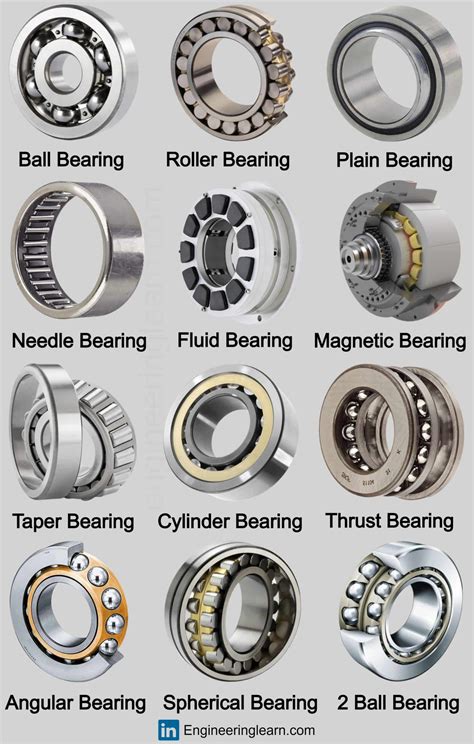Bearings: The Unsung Heroes of Our Modern World
Bearings, the humble yet essential components of countless machines and devices, play an indispensable role in our daily lives. Standing for an astounding 80% of all failures in rotating machinery, they are the unsung heroes that keep our world moving smoothly and efficiently. From the tiny ball bearings that whir within our computer fans to the massive roller bearings that support our towering skyscrapers, bearings are the silent workhorses that ensure a myriad of applications function seamlessly.
The Importance of Bearings
Bearings reduce friction between moving parts, enabling them to operate smoothly and efficiently. Without bearings, the friction generated by contact between surfaces would quickly grind machinery to a halt or cause excessive wear and tear. Bearings also support loads, preventing shafts and other components from bending or breaking under pressure.
Types of Bearings
There exists a wide array of bearing types, each designed for specific applications and load requirements. Some of the most common types include:
-
Ball Bearings: These bearings use small, spherical balls to reduce friction between two surfaces. Ball bearings are versatile and can handle both radial and axial loads (forces acting perpendicular and parallel to the shaft, respectively).


-
Roller Bearings: Roller bearings utilize cylindrical rollers to transmit loads. They are typically more robust than ball bearings and can withstand higher loads.
-
Needle Bearings: Needle bearings employ thin, needle-like rollers to minimize friction and space requirements. They are ideal for applications with limited radial space.
-
Thrust Bearings: Thrust bearings are designed to handle axial loads. They consist of a flat washer-like component that slides against another flat surface.

Applications of Bearings
Bearings find applications in a vast array of industries and settings, including:
-
Automotive: Bearings are used in engines, transmissions, and wheel assemblies.

-
Aerospace: Bearings are critical for aircraft engines, landing gear, and control systems.
-
Industrial Machinery: Bearings support and reduce friction in motors, pumps, conveyors, and other heavy-duty equipment.
-
Consumer Electronics: Bearings are found in computers, fans, printers, and other electronic devices.
-
Medical Equipment: Bearings enable smooth and precise movement in surgical instruments, MRI machines, and other medical devices.
Factors to Consider When Selecting Bearings
When selecting bearings for a particular application, several factors must be considered:
-
Load Requirements: Determine the magnitude and direction of the loads that the bearings will experience.
-
Speed: Consider the operating speed of the application and choose bearings that are rated for the appropriate speed range.
-
Lubrication: Select bearings that are compatible with the available lubrication methods and intervals.
-
Environmental Conditions: Account for factors such as temperature, humidity, and exposure to corrosive substances.
-
Cost: Weigh the initial cost of the bearings against their expected lifespan and maintenance requirements.
Maintenance and Troubleshooting
Proper maintenance and troubleshooting are crucial for ensuring optimal bearing performance and longevity. Regular lubrication, condition monitoring, and prompt replacement of worn or damaged bearings are essential practices. Signs of bearing failure include increased noise and vibration, excessive heat, and reduced efficiency.
Common Mistakes to Avoid
Several common mistakes can lead to premature bearing failure:
-
Overloading: Exceeding the load capacity of bearings can cause rapid wear and damage.
-
Improper Installation: Incorrect installation can result in misalignment, binding, and premature failure.
-
Insufficient Lubrication: Inadequate lubrication can lead to increased friction, wear, and overheating.
-
Exposure to Contaminants: Dirt, dust, and moisture can accelerate bearing wear and corrosion.
-
Ignoring Maintenance: Neglecting regular maintenance can lead to undetected problems that escalate into catastrophic failures.
Pros and Cons of Different Bearing Types
| Bearing Type |
Advantages |
Disadvantages |
| Ball Bearings |
Versatile, low friction, high speed |
Lower load capacity, radial clearance required |
| Roller Bearings |
Higher load capacity, rugged |
More complex structure, higher friction |
| Needle Bearings |
Compact, low friction |
Limited load capacity, axial clearance required |
| Thrust Bearings |
Handle axial loads |
Lower radial load capacity |
Humorous Stories
-
The Persistent Mechanic: A mechanic was tasked with replacing a faulty bearing in a heavy-duty machine. After hours of struggling, he finally managed to extract the old bearing but couldn't get the new one to fit. Frustrated, he called his supervisor, who arrived and promptly installed the new bearing with ease. When asked how he did it, the supervisor replied, "Simple. I read the instructions on the box."
Lesson: Always follow manufacturer's instructions to avoid costly mistakes.
-
The Misaligned Motor: A technician was troubleshooting a noisy electric motor. After disassembling the motor, he discovered that the bearings were misaligned. When asked how the misalignment occurred, the technician explained that the motor had been transported on a bumpy road without any cushioning.
Lesson: Proper handling and transportation are crucial for preventing bearing damage.
-
The Overloaded Bearing: An engineer was analyzing the failure of a roller bearing in a conveyor system. The bearing had seized due to excessive load. Upon further investigation, it was discovered that the conveyor was being overloaded by workers who were attempting to move heavier items than the system was designed to handle.
Lesson: Understanding load capacities and avoiding overloading are essential for bearing longevity.
Call to Action
Bearings play a vital role in the smooth and efficient operation of countless machines and devices. By understanding their importance, selecting the right type for each application, following proper maintenance practices, and avoiding common pitfalls, you can ensure that bearings continue to be the unsung heroes of our modern world.
